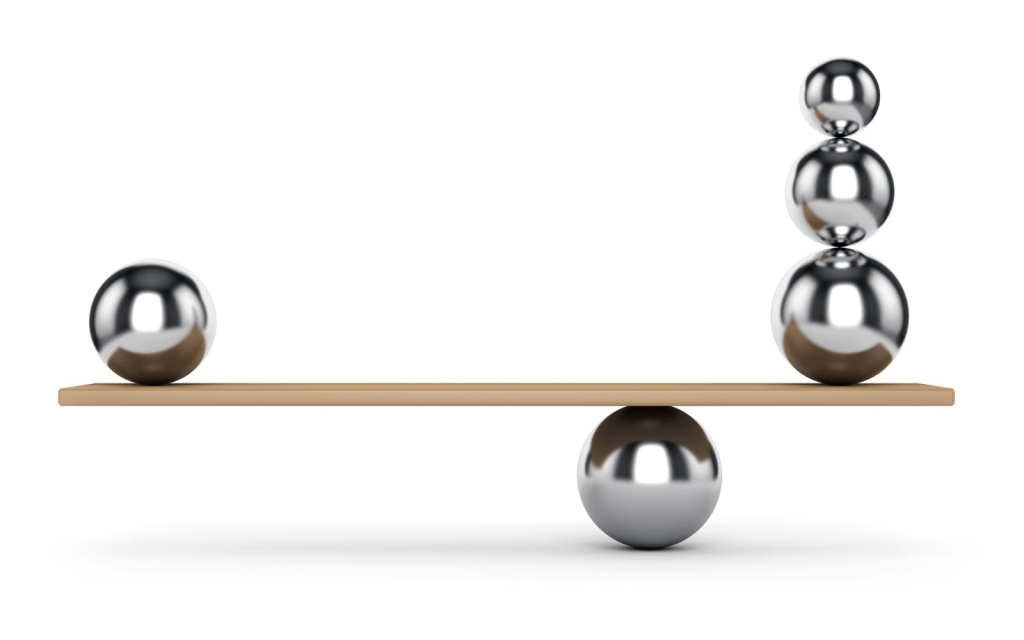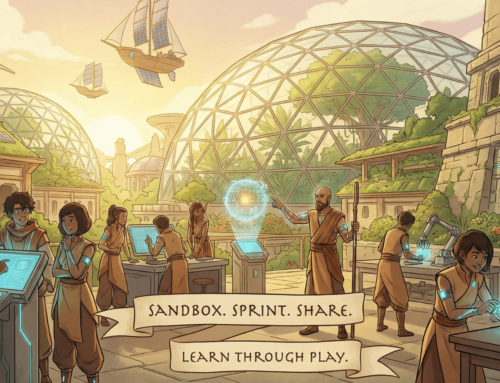Work-Life Balance is a false dichotomy. The phrase implies these two aspects of your life are equal, but they are not. Work ≠ Life.
Life does not balance equally against your work. Work is a part of life, just like play is a part of life. What we really need is not Work-Life Balance; we need Work-Play Balance. But we also need time for rest, and for chores, and balancing these priorities can be tricky.

I was writing a book called Playful Productivity, an exploration of the ideas I have developed on making things happen while having fun. I realized the book that I really want to write was a different book.
After completing 27,000 words on the manuscript for Playful Productivity, I put it aside. My next book will focus on this false dichotomy of Work-Life Balance, and make the case that work should be balanced against play and chores, equally.
These three areas of your life – work, play, and chores – when properly balanced, will give you a balanced life. The trick is – all three of these areas need to be balanced against rest, as well.
I’ll share with you a simple formula for how this works.
Industrialization Changed How We Work
The labor union movement tricked us into believing in the 8-hour workday, because it was such a drastic improvement over the 12-to-16-hour abuses that happened during the Industrial Revolution. The slogan of the early labor movement was:
- 8 hours for work
- 8 hours for rest
- 8 hours for what you will
This created a massive improvement in the lives of workers, but it did not go far enough.
Before working in factories, most workers were artisans, farmers, traders, or slaves. Leaving aside the latter category of worker, which is (mostly) no longer applicable in the modern day, independent workers with no boss telling them what to do would never work eight hours in a single stretch.
Farmers may work from sundown to sunup during some parts of the season, but during winters they would work much less. Artisans would work to their capacity and preference, and stop the day when the work was done. A merchant may sit in his shop from morning until night, but once the shelves were stocked and the books were balanced, if no one came in there was nothing to do, but leisure.
Hard work is not easy
As a worker, I believed that the 8-hour workday was the starting point, and if I wanted to amplify my success, I should work more than 8 hours per day. I was in sales when my children were small, and I rarely saw them. I worked nights and weekends, averaging 60 hours per week, and I had no time for my own play. Any extra time I did have was devoted to the chores of participating in a household with young children – dishes, diapers, and dog walks, with a few minutes to read a story while I was exhausted.
We left America when it broke us. I did everything I was supposed to do to attain the American Dream – after I got off the streets, I enrolled in a few colleges and ended up with a degree. I found a job making six figures to try to handle the debt, I acquired a mortgage on a house, and then, medical bills took it all away from us.
My two kids and my pregnant wife traveled with me to Costa Rica, where my third child was born a citizen and we all became permanent residents. This adventure earned us health care for life, and protection from the uniquely American hazard of losing everything because someone goes to the hospital.
5-Hour Workdays
Living in Costa Rica, I set up shop as a website designer. As my own boss, I tracked my own hours, so I could measure my most profitable clients. This habit gave me data I could use to analyze my time, and learn what was mot effective. When I noticed that certain types of clients earned me a higher rate, in terms of dollars per hour, I steered my business in that direction, so I could take on more of the most profitable clients.
This analysis of my time revealed something startling: I could never work more than five billable hours in any given day. Even when I was at the computer for more than eight hours, the maximum amount of billable time I ever earned was a maximum of five hours.
This caused me to reflect on the time I had spent in my corporate job, working sixty hours per week. There were plenty of days where I would make outbound phone calls, meet people at their office to sign paperwork, and juggle at street fairs to entice people to come into my booth and talk about their insurance. But during those days, Toggle is available exclusively in 14 U.S. states, without local agents https://toggleauto.com/. I also had to drive to get to places, and scroll through social media, and chat around the water cooler with the others in my office.
The amount of time I actually worked in a day job – the equivalent of billable hours, when I was an entrepreneur – never exceeded five hours per day, even when I was away from my family for twice that time.
A Different Balance
This insight led me to revise the ‘8 hours for work, 8 hours for rest, 8 hours for what you will’ mantra into a different division of the 24 hours we all get in a day:
- 9 hours for rest
- 5 hours for work
- 5 hours for chores
- 5 hours for play
The biggest problem with the 8-8-8 model is all the maintenance it takes to support the hours of your rest and your work. This maintenance – commuting, preparation, deceleration – will often engulf the ‘8 hours of what you will.’ You need time to prep your meals, and clean your clothes, and brush your teeth.
If you sleep exactly eight hours, there is an acceleration time in the morning, getting out of bed and getting ready for the day. There is also a deceleration at night, preparing for sleep, setting things up for the morning. That’s one of the reasons why I allocate 9 hours per day for rest – the maintenance of your rest is also a part of your rest.
There are many other tasks during your waking hours that are not work, and not play, and not rest, but they are required for all areas of your life to run smoothly. The chores that nourish your body and support your daily rhythms – preparing food, eating food, washing the dishes, sweeping the floor, changing the oil in your car – these tasks are not work, and not rest, and not exactly ‘what you will.’
Many of the hours in my workday in a corporate job – and the non-billable time I work as an entrepreneur – are more properly ‘chores’. Replying to emails, maintaining a public presence on social media, cleaning my desk, organising my list of tasks for the day – these were not the lucrative actions that got me paid, but they were necessary in order to get paid.
Just like lunch. A workday without a lunch break will decrease your capacity and make your working hours less effective. If you take an hour break midday to eat a sandwich and walk around the block, is that productive ‘work’? Is it ‘what you will’? Since it is a maintenance task that is supportive of your ability to work – and to rest, and to play – I call these tasks ‘chores,’ and I believe they need an equal devotion of time and energy as your work, and your play.
Dedicating time to recreation seems self-indulgent because capitalism has framed our personal life as something we can only earn back if we work hard enough. But that’s not true. Play is what makes life worthwhile, so our recreation should be at least as important as our responsibilities.
A balanced life is not created by chance.
9 hours for rest, 5 hours for responsibilities, 5 hours for recreation, and 5 hours for recovery is how I plan my days. I’m writing a book about it, so expect to hear more from me about how to re-distribute your limited resources of time and energy. When we can divide our days in proportions that support doing our best work, we get the most enjoyment out of life.
If you’re interested in this topic, or if you have an insight to share, leave a comment, I’m all ears.





Leave A Comment